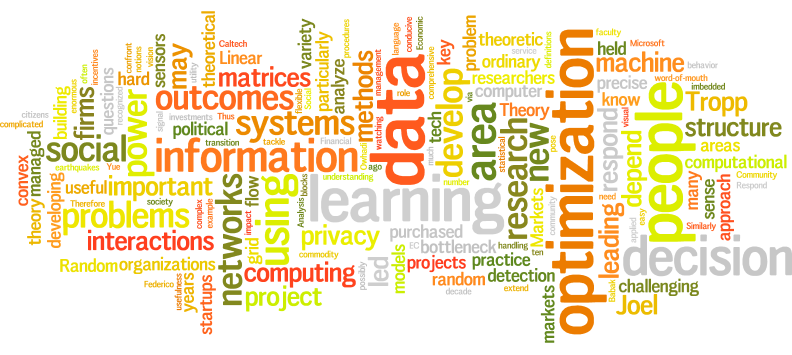In our increasingly data-rich world, it is more important than ever to develop principled approaches that can intelligently convert raw data into actionable knowledge. It is clear that intelligent information processing is now a critical bottleneck in many scientific and engineering endeavors, ranging from planning clinical trials to managing smart energy grids.
At Caltech, we take a broad and integrated view of research in data-driven intelligent systems. On the one hand, statistical machine learning is required to extract knowledge in the form of data-driven models. On the other hand, statistical decision theory is required to intelligently plan and make decisions given imperfect knowledge. Supporting both thrusts is optimization.
DOLCIT brings together people from machine learning, optimization, applied math, statistics, control, robotics, and human-computer interaction to form an intellectual core pertaining fundamental and applied research in "Decision, Optimization, and Learning at the California Institute of Technology (DOLCIT)." DOLCIT envisions a world where intelligent systems seamlessly integrate learning and planning, as well as automatically balance computational and statistical tradeoffs in the underlying optimization problems.

Research in DOLCIT
Research in DOLCIT spans traditional areas from applied math (e.g., statistics and optimization) to computer science (e.g., machine learning and distributed systems) to electrical engineering (e.g., signal processing and information theory). Further, we look broadly at applications spanning information and communication systems to the physical sciences (neuroscience and biology) to social systems (economic markets and personalized medicine). The group emphasizes an integrated approach to fundamental research and practical applications.
Analytic tools
- Mathematical optimization
- Convex relaxation methods
- Online algorithms
- Spatiotemporal modeling
- Scheduling & resource allocation
- Sparse approximation
- Randomized algorithms
- Graphical models
- Structured prediction
- Reinforcement learning
- Crowdsourcing
Application domains
- Learning with humans in the loop
- Personalized medicine
- Data-driven animation
- Robotics
- Autonomous Systems
- Sports analytics
- Learning in games
- Social networks
- Market design
- Computational vision
- Behavioral analysis
Research in DOLCIT is unique, in part, because of its focus on the interplay between the application domains and analytic tools above. This shows up in many of the ongoing projects in the group as well as in the broad backgrounds of the faculty and students that make up DOLCIT.
Interested in joining DOLCIT? We are actively recruiting students and postdocs. Click here for more information.